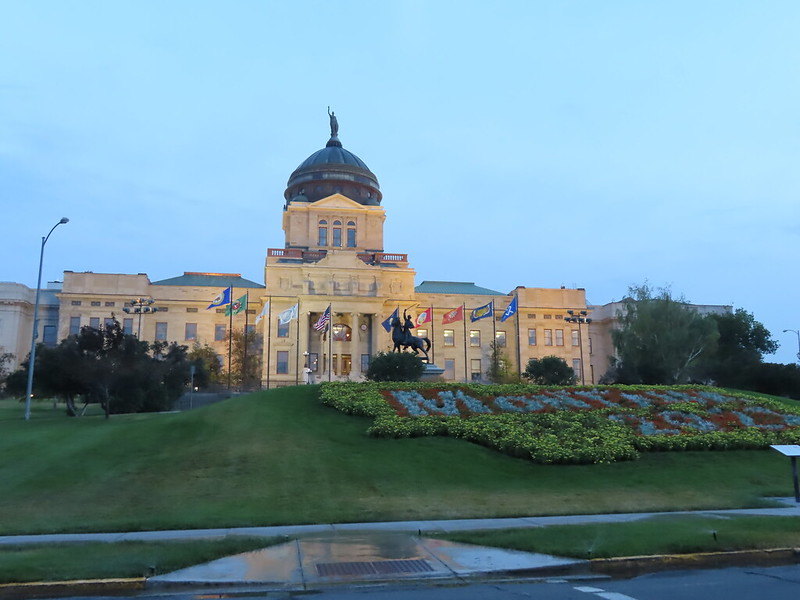Montana’s Republican-led state government has failed to stop a groundbreaking youth climate lawsuit against the state from going to trial, despite last-minute legislative moves that have altered Montana’s energy and environmental policies.
The state legislature’s Republican supermajority passed House Bill 971 just two weeks after it was introduced in April, and Gov. Greg Gianforte signed it into law on May 10. The measure bans “evaluation of greenhouse gas emissions and corresponding impacts to the climate in the state or beyond the state’s borders” in environmental impact studies of major projects, such as fossil fuel pipelines.
It updates a 2011 provision in the Montana Environmental Policy Act that barred consideration of environmental impacts beyond the state’s borders during the permitting process. Critics said this ban was implicitly aimed at preventing inclusion of regional and global climate impacts in environmental reviews of coal, gas, and oil projects.
The 16 children in the lawsuit, Held v. State of Montana, assert that the older MEPA provision, which was current when they filed their lawsuit, is an unconstitutional “climate change exception.” Montana’s constitution guarantees present and future generations the right to a clean and healthful environment.
Phil Gregory, an attorney for the children, said the new MEPA law strengthens their case, because it makes the “climate change exception” more explicit. Gregory has volunteered with Our Children’s Trust, a nonprofit that has spearheaded youth climate lawsuits in the U.S., to represent the Montana youth.
The state “knows that these greenhouse gas emissions are measurable, that they’re substantial, and all sorts of projects would be denied permitting if it could consider it,” Gregory told DeSmog. “The state’s climate deniers want to make sure that their denial is embodied in a statute, and that the science doesn’t have any role to play in an environmental assessment.”
The children are also represented by lawyers from the Western Environmental Law Center and McGarvey Law.
Sandra Zellmer, a professor at the University of Montana’s Blewett School of Law, agreed that the new law is very relevant to the case. “It will probably be one of the plaintiffs’ first exhibits,” Zellmer told DeSmog.
Supporters of HB 971, including the bill’s sponsor Rep. Josh Kassmier, have claimed the legislation is a response to an early April court ruling that threw out the state air permit for a gas-fired energy plant in Laurel, Montana. It is intended to prevent courts from using MEPA as a “tool to regulate carbon,” Kassmier said during a legislative hearing on the bill in April.
Kassmier did not respond to DeSmog’s inquiry on whether the youth lawsuit had any bearing on taking this legislative action.
Montana’s Many Attempts to Stop the Trial
Since early 2023, Montana has tried to undermine the Held case several times. In February, the state filed a demand with District Court Judge Kathy Seeley for summary judgment – a ruling that would nix the trial. On May 17, seven days after Gov. Gianforte signed the new MEPA law, the state asked the district court to dismiss the MEPA-related claim in the youth lawsuit, arguing that since the 2011 provision no longer exists, the youths’ legal challenge to that provision is moot.
On May 23, Seeley released an order rejecting the request for summary judgment, effectively refusing to cancel the trial. While not ruling on the state’s MEPA-related claim, Seeley did address the new MEPA law, indicating in the order that she is prepared to rule on its constitutionality after the trial. The measure “clearly implicates Plaintiffs’ fundamental right to a clean and healthful environment.”
However, Seeley agreed with Montana that another recent change to state law – the legislature’s repeal of the state energy policy in March – invalidated the lawsuit’s charges related to that policy, somewhat narrowing the trial’s scope.
On June 5, the state filed an emergency petition with the Montana Supreme Court, asking it to take over the case and stop the trial. The court promptly denied the petition, stating in a June 6 order that the trial, “with preparation literally years in the making, is set to commence less than a week from now; we are not inclined to disturb the District Court’s schedule at this juncture.”
The trial is scheduled to begin on June 12 and last for about two weeks.
Historic youth-led trial in Held v. State of Montana to hold state accountable for actions worsening the climate crisis + violating youth’s rights is less than two weeks away! Learn more, support youth, spread the word + watch trial: https://t.co/XhNkbLxGXi #HeldMakesHistory pic.twitter.com/ayq4VbVFUF
— Our Children's Trust (@youthvgov) May 30, 2023
Neither the Montana attorney general office nor the governor’s office responded to requests for comment.
“Despite the state’s last-ditch effort, this first of its kind trial will kick off on June 12, 2023, in Helena, Montana,” said Nate Bellinger, one of the attorneys representing the youth plaintiffs.
The Montana trial will be the first in U.S. history that claims a constitutional right to a safe and stable climate. A win by the youth plaintiffs “could set a very powerful legal precedent” reaching far beyond the Treasure State, according to Zellmer. “I think a victory for the Montana youth would really set the stage, provide a strong foundation for many of these other youth climate cases,” she said.
One of those cases – Juliana v. US, a lawsuit brought by 21 children against the U.S. government – is back on track towards a trial, after being dismissed in January 2020. On June 1, a federal judge ruled that the case can proceed under a revised version of the original complaint.
A lawsuit brought by fourteen youths challenging Hawaii’s petroleum-dependent transportation system is also advancing towards a trial. Like Montana, Hawaii has an environmental right embedded in its constitution.
Subscribe to our newsletter
Stay up to date with DeSmog news and alerts







